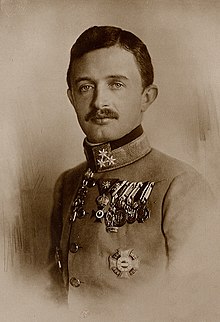
Back Karel I van Oostenryk Afrikaans كارل الأول إمبراطور النمسا Arabic كارل الاول امبراطور النمسا ARZ I Karl (Avstriya imperatoru) Azerbaijani بیرینجی کارل (اوتریش) AZB Карл I (Австрия императоры) Bashkir Карл I Габсбург Byelorussian Карл I Габсбург BE-X-OLD Карл I (Австро-Унгария) Bulgarian Karl Iañ Aostria Breton
| Charles | |||||
|---|---|---|---|---|---|
 Charles I, c. 1919 | |||||
| Emperor of Austria King of Hungary | |||||
| Reign | 21 November 1916 – 12 November 1918 | ||||
| Coronation | 30 December 1916 | ||||
| Predecessor | Franz Joseph I | ||||
| Successor | Monarchy abolished | ||||
| Born | 17 August 1887 Persenbeug-Gottsdorf, Austria-Hungary | ||||
| Died | 1 April 1922 (aged 34) Funchal, Madeira, Portugal | ||||
| Spouse | |||||
| Issue | |||||
| |||||
| House | Habsburg-Lorraine | ||||
| Father | Archduke Otto Franz Joseph of Austria | ||||
| Mother | Princess Maria Josepha of Saxony | ||||
| Religion | Roman Catholicism | ||||
| Signature |  | ||||
Charles I (German: Karl Franz Josef Ludwig Hubert Georg Otto Maria, Hungarian: Károly Ferenc József Lajos Hubert György Ottó Mária; 17 August 1887 – 1 April 1922) was Emperor of Austria, King of Hungary, and the ruler of the other states of the Habsburg monarchy from November 1916 until the monarchy was abolished in April 1919. He was the last of the monarchs belonging to the House of Habsburg-Lorraine to rule over Austria-Hungary. The son of Archduke Otto of Austria and Princess Maria Josepha of Saxony, Charles became heir presumptive of Emperor Franz Joseph when his uncle Archduke Franz Ferdinand of Austria was assassinated in 1914. In 1911, he married Princess Zita of Bourbon-Parma. He is venerated in the Catholic Church, was beatified by Pope John Paul II on 3 October 2004, and is known to the Catholic Church as Blessed Karl of Austria.[1]
Charles succeeded to the thrones in November 1916 following the death of his great-uncle, Franz Joseph. He began secret negotiations with the Allies, hoping to peacefully end the First World War, but was unsuccessful. Despite Charles's efforts to preserve the empire by returning it to federalism and by championing Austro-Slavism, Austria-Hungary hurtled into disintegration: Czechoslovakia and the State of Slovenes, Croats and Serbs were proclaimed, and Hungary broke monarchic ties to Austria by the end of October 1918. Following the Armistice of 11 November 1918, Charles "renounced any participation" in government affairs, but did not abdicate. However, the Republic of German-Austria was proclaimed the following day, and in April 1919 the National Assembly formally dethroned the Habsburgs and banished Charles from German-Austria for life.
Charles spent the early part of his exile in Switzerland. He spent the remaining years of his life attempting to restore the monarchy. He made two attempts to reclaim the Hungarian throne in 1921; but failed due to the opposition of Hungary's Calvinist regent Admiral Miklós Horthy. Charles was exiled for a second time to the Portuguese island of Madeira, where he soon fell ill and died of respiratory failure in 1922.
- ^ "Blessed Karl of Austria". Emperorcharles.org. Retrieved 3 January 2018.